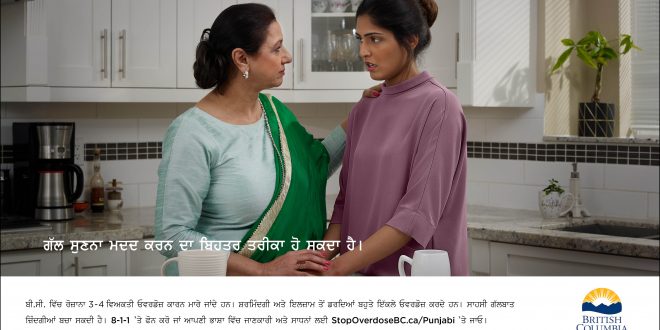Listening can be one of the best ways you can help a family member experiencing mental health and addiction challenges
By Rachna Singh
MLA Surrey-Green Timbers
This week our government is launching a campaign encouraging families to start having courageous conversations about mental health and addiction challenges. The campaign makes life-saving resources more accessible by having translated information on the StopOverdosebc.ca website and Punjabi ads that highlight the importance of listening without judgement. By taking the time to listen with empathy, compassion and understanding, we can open the door for our loved ones to share what they are going through and allow them to reach out for help. To put it simply, talking saves lives.
The overdose crisishas taught us that no one is immune – addiction and mental health challenges can affect anyone.We all need to be ready and willing to help each other without judgement. If someone in my family experienced an overdose, I hope that they wouldn’t be left to suffer alone. That someone would help them. Because we are all someone’s family and deserve to be treated that way.
Learning how to help has never been easier. By calling 8-1-1 or visiting StopOverdoseBC.ca/Punjabi, you can access Punjabi resources on how to respond to an overdose, where to go for services and supports and how to support a loved one who might be experiencing mental health and addiction challenges.
Stigma is as dangerous as any drug.It can leave people suffering in silence, unable to ask for help. It can isolate people from their loved ones and trap them in a lonely spiral of shame and blame that can be extremely difficult to overcome. On top of that, stories of systemic racism, discrimination and lack of culturallyaware services in our system of care can make the idea of reaching out for help even more daunting.
 But that narrative is changing: slowly but surely. More people are coming forward and saying mental health challenges are notweaknesses andaddiction is not a moral failing. We know that there is nothing more courageous than reaching out for help. We know that it’s okay to not be okay. And we know by sharing our stories, we can build stronger communities where talking about mental health and addiction challenges is not taboo butencouraged.
But that narrative is changing: slowly but surely. More people are coming forward and saying mental health challenges are notweaknesses andaddiction is not a moral failing. We know that there is nothing more courageous than reaching out for help. We know that it’s okay to not be okay. And we know by sharing our stories, we can build stronger communities where talking about mental health and addiction challenges is not taboo butencouraged.
Everyone deserves the chance to find their own unique pathway to healing and hope. That’s why earlier this year, we expanded service hours at the Roshni Clinic, which offers culturallytailored and language-specific services in Punjabi, Hindi and English for people living with addiction challenges. Last month, the Minister of Mental Health and Addictions Judy Darcy launched A Pathway to Hope, a plantoimprove mental health and addictions care across the province.The Pathway outlines our priorities for building a seamless, integrated system of care where cultural awareness and humility are embedded in services at every opportunity.
We have a long road ahead of us to get to a place where more peoplefeel comfortable and supported sharing their mental health and addiction challenges. But it starts with us, in our homes, in our neighbourhoods, and our communities and builds out from there. It can all start with a simple conversation that could help save a life.
 Desi Today Magazine
Desi Today Magazine




